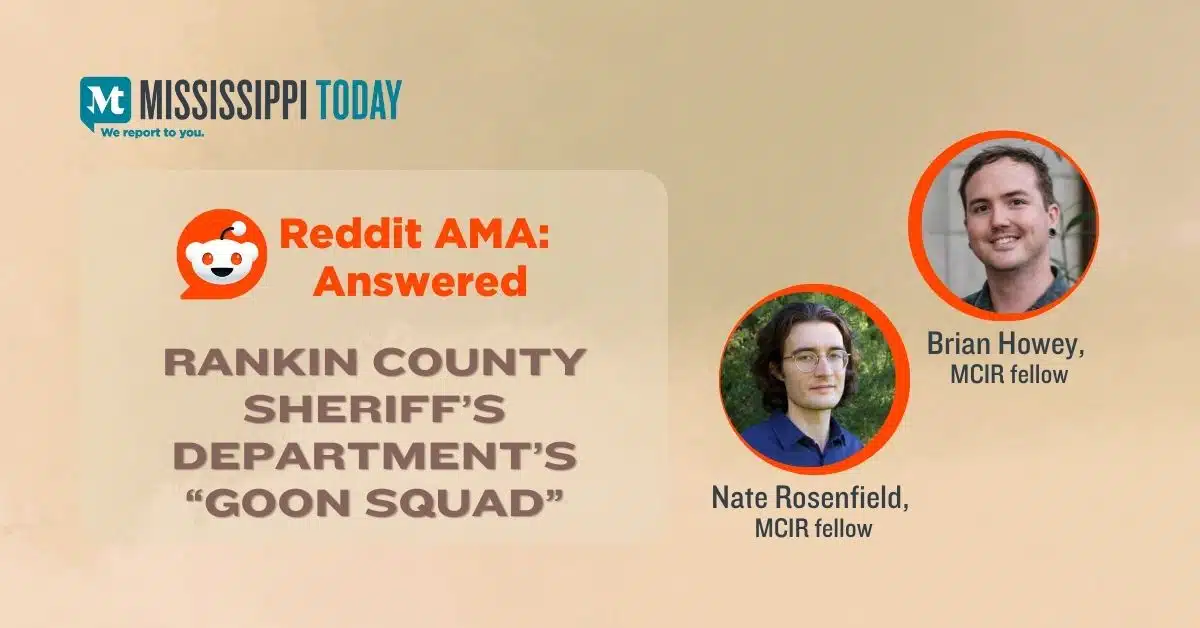Mississippi Today
Reddit AMA recap: Rankin County Sheriff’s Department’s ‘Goon Squad’ with Brian Howey and Nate Rosenfield


Brian Howey and Nate Rosenfield, Mississippi Center of Investigative Reporting at Mississippi Today fellows, answered your questions on Reddit about the Rankin County Sheriff’s Department’s “Goon Squad,” a loose band of deputies who allegedly tortured residents for years.
Read their answers below and visit this page for more investigations on Mississippi sheriffs.
Some questions have been edited for length and clarity.
Q: Do you think that there are likely other Goon Squads across the state? And if so, how can we uncover them?
Click for Nate Rosenfield’s answer.
Great question! That’s definitely been on our minds as well. It’s hard for us to say at this point whether there are other ‘Goon Squads’ across the state. We’ve heard about similar allegations of abuse in other departments. We haven’t looked into whether any of these are related yet.
It was clear from the start with the Michael Jenkins and Eddie Parker case that the “Goon Squad” wasn’t limited to the Rankin County Sheriff’s Department. One of the men was a Richland PD officer. But we don’t know the full extent of this overlap between departments or even how involved this one officer was in other incidents.
To find out more we’re going to use the same old shoe leather reporting methods. Talk to people who say they’ve experienced this type of conduct, file records requests with the departments and pursue these questions doggedly until we find answers.
Q: How could someone without a journalism degree (but a degree nonetheless) get involved with work like this?
Click for Nate Rosenfield’s answer.
Do you mean doing investigative work? I would throw out a little bit of caution there. One thing to consider is the sensitivity and danger of this case for so many of the people involved. Our investigation was backed by a whole team of editors, lawyers and investigative reporters and the New York Times and Mississippi Today with decades of experience in pursing investigations following ethical and legal guidelines.
But there are aspects of this that anyone can pursue. Any citizen can file public records requests with these departments that abide by Mississippi’s public records laws. You can attend county board of supervisor meetings and local protests and press conferences where leaders and activists are discussing this issue to learn more. And you can try to talk with public officials about their conduct and what they’re doing to prevent these kinds of abuses.
It’s so important for everyone to be engaged, informed, curious and invested in these issues.
Q: What is the state of FOIA law(s) in Mississippi, as compared to other states, and are head sheriffs in Mississippi an elected or appointed position? If elected, did that in any way play a role in the, for lack of a better phrase, culture of lawlessness that developed in that office?
Click for Nate Rosenfield’s answer.
The FOIA laws here are similar to other states. Actually the time span in which agencies have to respond is pretty quick here—only seven days. But like with all states, the reality is that responsiveness is going to vary by agency. Each agency has their own resources and cultures around facilitating public access to records. And there are specific provisions of the law that apply to different agencies and circumstances. I’m going to shout out Robert Wentworth at the MS Department of Public Safety as one of the most considerate, professional and swift public records administrators I’ve ever worked with. If you have specific questions about the laws, I’m happy to try to dig around and learn more for you.
Sheriffs are elected positions. One important aspect of how the role operates is that Sheriff’s don’t have other offices that they are beholden too. For instance, local police departments are usually overseen by municipal governments, which typically have the ability to fire department leaders. But that’s not true for Sheriff’s. Their departments can be investigated by other law enforcement agencies like MBI and the FBI for criminal conduct. And their budgetary decisions have to be approved by the county board of supervisors. But it’s really hard to fire a sheriff for doing a bad job. They really have to be deposed through elections for the most part.
Whether that accounts for the lawlessness in the department, I can’t say. But I would point out that Sheriff’s typically have a lot power politically and legally within the counties they oversee. Our investigative series is trying to explore what kinds of abuses can occur in these departments with the current state of oversight.
Q: What consequences do you reasonably expect them to face for their actions? What consequences are you hoping for?
Click for Nate Rosenfield’s answer.
Our job as reporters is to try to get the truth out there. What happens after that is best left up to the public.
I can say that the sentencing guidelines for the crimes the six officers indicted this summer are currently facing are steep. They could be serving decades in prison. And that’s just for those two incidents.
Q: How do we stop this happening again? Can the law be changed to prevent it being set up by other people? If so, who is stopping that from happening?
Click for Nate Rosenfield’s answer.
As a reporter I might not have the best answer for this question.
I think it’s important to consider all the things that went right in this situation and helped bring the truth forward as a model for how to prevent similar abuse in the future.
A few years ago, a state law was introduced that mandated that MBI look into any officer involved shootings in Mississippi. That’s what got them on the scene right away when Michael Jenkins was shot. And it’s our understanding that MBI began to see signs of wrongdoing and that’s when the Feds were brought in.
In all of the cases we looked into, no one was shot.
Also, the justice department conducted an incredibly swift and thorough investigation and provided a lot of detail to the public about what they found. The criminal information that was produced during the officers’ indictment gave a detailed walk through of everything they did that night. This helped bring clarity and attention to the issue.
What we see in both cases is outside agencies with mandates to investigate wrongdoing by law enforcement agencies acting swiftly and informing the public.
Whether this should have happened sooner and what checks and balances to put in place to ensure that it will in the future is a bigger question it might be best to ask your local congressional leaders.
I’ll add that accountability in policing is a massive issue nationally with a long history. If you’re looking for an introduction into the legal frameworks for holding police accountable I’d personally recommend this book: https://www.amazon.com/Shielded-How-Police-Became-Untouchable/dp/0593299361 It’s definitely got an argument it’s putting forward, but it’s also a really comprehensive look at the legal frameworks currently in place and how they came to be.
Q: Is the justice department still investigating the department or other officers?
Click for Brian Howey’s answer.
Yes, the Justice Department is still investigating the Rankin County Sheriff’s Department. A couple days after our story published, the DoJ published this press release, asking for anyone who’d experienced abuse at the hands of Rankin deputies to contact them as soon as possible.
Q: A couple of months ago, an attorney with the Rankin SO resigned (I think his last name was Holly), what can you tell us about his resignation? Also, I read where there were 6,000 write in votes opposing Sheriff Bailey, which lead me to wonder, what are the legal/political mechanisms available to Rankin county voters to remove Sheriff Bailey?
Click for Nate Rosenfield’s answer.
Paul Holley was the department’s lawyer. He then briefly became undersheriff before resigning in Oct. We’re not sure exactly why he resigned. He made a public statement that didn’t explain exactly why he left. We found department records that showed Holley was present at one on of the incidents we reported on. We don’t know what if any involvement he had though. He’s working for the Attorney General’s office now I believe.
The most direct and powerful legal mechanism voters have to remove Bailey is to vote during the next election. Also there needs to be organizing to rally a contender. He ran unopposed this year.
Q: Have you taken a look at how many people Christian Dedmon has shot (or how many officer involved shootings he has been present for) vs any other officer at a different agency? because i think that could be interesting.
Click for Brian Howey’s answer.
Thanks for this question! In addition to the shooting of Michael Jenkins, we know that Christian Dedmon was present during the fatal shootings of Pierre Woods and Shawn Fondren, and that he fired his weapon during the incident involving Shawn Fondren. How that compares to officers at other agencies depends on which agency and which officer you’re looking at. Many police officers go their entire careers without firing their weapons in the line of duty. A few have been involved in several shootings. As a deputy who was present for at least three shootings, Mr. Dedmon appears to fit somewhere in the middle of those two poles.
Q: Could y’all speak a little about the areas of Rankin that a lot of these incidents took place and did anything about the locations in particular facilitate officers ability to get away with unethical behavior?
Click for Brian Howey’s answer.
This is a great question. Based on the incidents we reviewed, the majority of these alleged torture cases occurred in low-income neighborhoods in Rankin County. Many of these local residents described near-nightly raids in their communities. Certain neighborhoods, such as the Robinhood community in Brandon, Miss., were especially popular areas for the deputies. So yes, location was a factor, but it’s more complicated than that…
Nearly all of the people targeted by the deputies were suspected drug users or small-time dealers. Combine their income with their drug use, and you have a group of people who are unlikely to be believed by authority figures. And that’s exactly what we saw: even in cases where people lodged complaints, filed lawsuits, and fought their criminal charges, even when they showed up to court visibly injured, there doesn’t appear to have been any serious investigation conducted by anyone with the authority to do so. I hope that answers your question!
Q: Is there a federal investigation into RCSO?
Click for Brian Howey’s answer.
Yes, the Justice Department has investigated the incident involving Michael Jenkins and Eddie Parker and filed charged against 5 deputies and a local police officer for their roles in that incident. Those six officers also face state charges for the same incident. The DoJ’s investigation is ongoing, and shortly after we published our investigation, the department requested more information from anyone who’d experienced abuse at the hands of Rankin deputies.
Q: Are there any additional members to the goon squad that were not present for this incident? Or is good squad use to describe the entire RCSO?
Click for Brian Howey’s answer.
It’s difficult to say who was officially a “member” of the Goon Squad, which was a night shift of patrol deputies at the Rankin County Sheriff’s Department. What we can say is that we used department incident reports, dispatch records and Taser logs to identify 20 deputies who were listed as present during the additional alleged torture incidents we uncovered. Five of those deputies are currently facing criminal charges. What role those additional 15 deputies played in these incidents is hard to determine, but we were able to identify several deputies who have so far eluded criminal charges and who appear to have triggered their Tasers during several of these alleged torture incidents.
Q: Has the county leader commented on any of this? Gains, Cross? Have you attempted to talk with them?
Click for Brian Howey’s answer.
We asked for comments from several local leaders before we published our story, they either declined to comment or did not respond. We will continue to ask!
Q: Do you know of any recall efforts or protest?
Click for Brian Howey’s answer.
There have been several protests at the Rankin County Sheriff’s Office and other locations around county, as well as numerous calls for Sheriff Bryan Bailey to resign. We’ve been told there are additional protests in the works as well.
Q: We’re being told time and again about this kind of behavior from law enforcement. What realistically can change, even with more and more reports from media outlets like yourselves, and what defense do you have against cops with a vendetta against your media, a la Kansas’s Marion County Record raid?
Click for Brian Howey’s answer.
I think these would make for great questions for your local, state and national lawmakers, who have the power to implement stronger accountability mechanisms for law enforcement agencies, something we’ve seen happen across the country in the wake of George Floyd’s murder. One thing our and our colleagues’ reporting has exposed is the general lack of effective accountability mechanisms for sheriff’s departments, especially in Mississippi. That this extreme level of alleged misconduct could continue for nearly 20 years before triggering a serious investigation by a higher authority is astounding. This can change, but that change requires action by local, state and national representatives. As journalists, all we can do is deliver the truth and hope that voters and lawmakers put that information to good use.
As reporters, our best defenses against anyone that seeks to quash the freedom of the press are the First Amendment and voters. We’re extremely lucky to enjoy constitutional protections that enshrine our ability to do our work with little fear of reprisals. But we’ve never seen a greater threat to press freedoms than we are seeing today. We rely on the public and elected officials to hold accountable anyone who seeks to infringe on those rights and protect our ability to do hard-nosed reporting. We also rely on readers who support good journalism, especially local journalism! So if you want to keep reading investigative reporting like Nate’s and my deep-dive into the Goon Squad, make sure to support your local news outlet!
Q: Have you had to make changes to your own lifestyle out of safety / have you ever feared for your own safety after all of this? With how insane these accounts are, I’m concerned for you all.
Click for Nate Rosenfield’s answer.
I really appreciate this question and your concern for us. We definitely had to manage safety issues throughout the reporting process. We have a whole team at the Times devoted to this that we consulted with. We had to think a lot about how to protect ourselves and our sources. Fortunately, everything’s worked out fine so far. But it’s definitely been a stressful part of this process.
Q: Have you looked into other areas of Mississippi for similar corruption and/or scandals?
Click for Nate Rosenfield’s answer.
Jerry Mitchell and Ilyssa Daly, two amazing reporters on our team, did incredible investigations into the Clay County Sheriff’s Department and the Noxubee County Sheriff’s Department. You should definitely check them out!
Q: Do you truly believe the Sheriff wasn’t aware like he is saying?
Click for Nate Rosenfield’s answer.
I think we found some compelling evidence that the Sheriff had been alerted that there was a problem. Multiple sources told us they filed complaints, wrote letters, sent facebook messages to the sheriff directly or called him on the phone to talk about the abuse of these same deputies.
Q: Have you guys heard of the Pasco Sheriff FL squad of deputies that would target and harass citizens? You guys should look into it. They are being sued but rumor is it is still ongoing. No physical torture but definitely psychological. I wonder how similar these groups operated.
Click for Nate Rosenfield’s answer.
Yeah! There was a great investigation on this by the Tampa Bay Times. Truly insane. It seems like that was a case where official department policy went haywire, leading to potentially unconstitutional conduct rather than a group of officers engaging in explicitly criminal conduct and covering up their actions, like what’s been alleged here. But there are definitely some important overlaps, good point!
Q: Are you guys going to do an investigation into the city police departments within Rankin County? like Pearl Brandon or Richland? I read where the Pearl Police Chief was involved in at least one of the incidents. Will he be investigated? Do you think that he should be allowed to lead a force if he was apart of the Goon Squad?
Click for Nate Rosenfield’s answer.
Great question! We’re still looking into the level of involvement of officers at other departments. One Richland PD officer was involved in the Michael Jenkins and Eddie Parker case. And we reported that the current Pearl Police Chief, Dean Scott was present at least one of the incidents in our story when he was a Rankin Sheriff’s Deputy. Whether that raises questions about his fitness for office is for the community and their representatives to decide. But it’s an important question!
Q: It amazes me that these people, Baltimore’s infamous gun trace task force, LAs ‘gang’, all operate for years before doing something stupid and getting caught. You’d think with social media, these folks would tend to gravitate together. Were you able to find any social media ties between this bunch and officers at other departments that would be outside their locale?
Click for Nate Rosenfield’s answer.
Great question! We found that some of the these deputies had social media contacts with officers at other departments. That alone doesn’t say much, but it’s definitely a lead. We haven’t spotted anything overt about collaboration in misconduct on social media though.
Q: Were they gooning for someone bigger than the sheriff?
Click for Nate Rosenfield’s answer.
That’s a big question. We’re hoping to find the answer. Still very unclear at this point but if we find anything you’ll know about it. Stay posted.
Q: What is the likelihood other such “gangs” are operating across Mississippi LEOs? I believe this kind of thing is an off-shoot of the militarization of local police — in the Jackson metro area, how many SWAT teams, response teams, drug task forces, etc., are there? Probably a mind-blowing number of teams, and they probably all share the same 25-50 personnel.
Click for Nate Rosenfield’s answer.
We’re definitely looking into similar conduct across different departments. We didn’t find that the events we reported on in Rankin had to do with any militarization of the department. But we haven’t looked into that issue in the area. Definitely worth further exploration. Great questions!
Q: Have any of the accused made a statement about their alleged actions?
Click for Nate Rosenfield’s answer.
Not yet. We expect that the officers who’ve been indicted will speak at their sentencing in January. And others may come forward with time. But so far we’ve been met with silence.
Q: How much support does the goon squad have from locals and other citizens of Mississippi? How many, cops or otherwise, wish they could get away what those guys did? Do you believe a majority of Mississippi citizens agree that a person’s civil rights are forfeit as soon as they’re accused of a crime?
Click for Nate Rosenfield’s answer.
I know that the mood in Rankin County shifted a lot after the federal indictment came down this summer and after our story dropped last month. A few months ago we heard a fair amount of skepticism about what was going on in the department. Now we’re hearing pretty unanimous outrage.
I can’t speak for cops or the majority of Mississippians. But I can say that most of what we’ve heard from community members in the area in the past few weeks—including people involved in law enforcement—has been condemnation of these deputies’s actions.
Q: Do you know if they could possibly be charged for sexual assault since they apparently used a sex toy during the torture.
Click for Nate Rosenfield’s answer.
The Federal case against the officers were related to constitutional violations, not criminal charges. The state cases against the 6 officers in August were criminal. They were mostly related to covering up evidence. Hunter Elward, who fired the gun in Michael Jenkins mouth, was charged with assault. There were no charges related to the sexual violence. That doesn’t mean state prosecutors couldn’t have pursued those charges or won’t in other cases, but so far that hasn’t been their strategy.
This article first appeared on Mississippi Today and is republished here under a Creative Commons license.
Did you miss our previous article…
https://www.biloxinewsevents.com/?p=313608
Mississippi Today
Mississippi school superintendents indicted on fraud charges
The superintendents for Leake County and Hollandale school districts and a consultant have been indicted on four federal counts of conspiracy to commit embezzlement, theft and bribery.
According to the indictment, Earl Joe Nelson, while superintendent of Clarksdale Municipal School District and now Leake County School District, and Mario D. Willis, as superintendent of Hollandale School District, allegedly paid each other tens of thousands of dollars in school funds for consultant services that were never rendered from November 2021 until at least June 2023.
Additionally, the duo is accused of stealing U.S. Department of Education funds that were intended for their respective districts.
A St. Louis-based consultant and teacher, Moneka M. Smith-Taylor, has also been indicted on bribery charges in connection with the case. She allegedly received more than $250,000 from Willis for consulting services that were never provided over the course of two years.
She returned part of that money to Willis in the form of a cash kickback in return for the consulting contract, the indictment says.
A spokesperson for the Mississippi State Department of Education directed Mississippi Today to local school boards, who make personnel decisions for their respective districts, for comment.
The job status of the two superintendents is unclear. District officials could not be reached by presstime, but Willis is still listed as the superintendent of Hollandale School District and Nelson is still listed as the superintendent of Leake County School District in the state education department’s online directory.
It’s also unclear whether the defendants have a lawyer who could speak on their behalf.
This article first appeared on Mississippi Today and is republished here under a Creative Commons Attribution-NoDerivatives 4.0 International License.
The post Mississippi school superintendents indicted on fraud charges appeared first on mississippitoday.org
Note: The following A.I. based commentary is not part of the original article, reproduced above, but is offered in the hopes that it will promote greater media literacy and critical thinking, by making any potential bias more visible to the reader –Staff Editor.
Political Bias Rating: Centrist
The article reports on the indictment of two Mississippi school superintendents and a consultant on federal fraud charges in a straightforward, factual manner. It presents the legal allegations without editorializing or taking a stance. The language is neutral and focused on relaying verified information from the indictment and official sources, without suggesting guilt or innocence. There is no evident ideological framing or advocacy; rather, the piece sticks to reporting the details of the case and the status of the individuals involved. Thus, the article adheres to objective journalistic standards without discernible political bias.
Mississippi Today
Defendant in auditor’s ‘second largest’ embezzlement case in history goes free
Four years ago, agents from the state auditor’s office arrested Tunica nonprofit operator Mardis Jones in what the office trumpeted as the second-largest embezzlement case in its history and demanded Jones return over $1 million to the state.
The charges accused Jones of stealing $750,000 from a home rehabilitation program he was supposed to be administering while turning away needy rural residents living in crumbling houses.
But his defense attorney attacked holes in the case, and last month, a local jury found Jones not guilty of the criminal charges. Now, the state has made no indication it will bring a civil case to try to claw back the money from him.
Jones’ nonprofit Tunica County Housing Inc. secured a subcontract with the county through the North Delta Regional Housing Authority in 2014 to run the county’s home rehabilitation program funded with casino revenue. For his work, vetting applications and managing expenses, Jones earned $12,000 a month.
At the core of the criminal case were “strange money transfers” and a finding that several of the people whose applications for home rehab were approved allegedly never received any repairs to their homes. According to the auditor’s office, investigators found less than 20% of the nearly $2 million Jones’ nonprofit received went to the contractors working to rehab homes.
“Once again, an arm of government trusted a private organization to run a government program, and a large percentage of the program’s spending was flat out stolen,” State Auditor Shad White said in a press release after the arrest.
Attorney General Lynn Fitch echoed White, saying, “These funds – hundreds of thousands of dollars – were meant to help the elderly, handicapped, and poverty stricken. But the funds never got to the vulnerable citizens who needed it most.”
Jones’ lawyer Carlos Tanner explained to Mississippi Today that the program operated with an extreme backlog, and that “some of the people they were claiming didn’t get their houses done actually did” by the time the trial was held this year.
The program was poorly administered, Tanner said, meaning that even if a person’s application was approved and a rehab contract prepared, county officials could direct Jones to put someone else’s repair job ahead of his or hers.
“But just because it was run like a first weekend lemonade stand does not mean Mardis Jones stole money,” Tanner said.
Tanner said the investigators gathered paltry evidence, only looking at details that fit their narrative. While Jones did earn a large salary through his contract, Tanner said prosecutors never presented evidence that Jones converted money that was supposed to be used on home rehabilitation to his personal use.
Investigators got a warrant to seize Jones’ electronics, Tanner said, but “they never bothered to search it.”
“The two OSA (Office of the State Auditor) officials who were running the investigation, I questioned them about it during trial, and neither of them could tell me where the computer was, where the phone was, or what the contents were,” Tanner said.
Jacob Walters, a spokesperson for the auditor’s office, defended the way the investigators handled the case, saying, “The state auditor’s office is never going to turn a case we investigated over to a prosecutor unless we’re fully confident in the work that we did.”
At the time the auditor’s office announced the Jones arrest, it also said it delivered a demand letter ordering Jones to repay over $1 million, the money it alleged he stole plus interest and investigative expenses.
It’s up to the attorney general or local district attorney to decide how to prosecute auditor investigations, or in Jones’ case, what happens to the civil demand now that a jury found him not guilty in the criminal case.
When a person receives a demand alongside his or her arrest, regardless of what happens with criminal charges, the claw back can be enforced through civil litigation — much like the case against several defendants in a stunning Mississippi Department of Human Services fraud case, which began in 2020 and has yet to be resolved. Walters said the demand against Jones is still the office’s next-largest in history, second only to the welfare scandal.
The government might choose to pursue civil litigation, even if criminal prosecution is unsuccessful, because there is a lower burden of proof to win civil cases.
But the attorney general’s office told Mississippi Today last month that it had not received the Jones demand letter from the auditor, meaning it has nothing left to enforce.
Walters said the auditor’s office sent the letter along with the case file four years ago, but that with a turnover in attorneys prosecuting the case, the auditor had to resend the file last year. If the attorney general’s office no longer possesses the demand document, Walters said, “it’s an incredibly easy problem to resolve.”
“Just reach out to us with a single phone call or email and we can get it to you,” Walters said.
After the interview, the auditor’s office sent the demand letter by email, and the attorney general’s office confirmed it was received.
This article first appeared on Mississippi Today and is republished here under a Creative Commons Attribution-NoDerivatives 4.0 International License.
The post Defendant in auditor’s ‘second largest’ embezzlement case in history goes free appeared first on mississippitoday.org
Note: The following A.I. based commentary is not part of the original article, reproduced above, but is offered in the hopes that it will promote greater media literacy and critical thinking, by making any potential bias more visible to the reader –Staff Editor.
Political Bias Rating: Centrist
This article presents a factual and balanced account of the embezzlement case involving Mardis Jones without overt ideological framing. It reports statements from both government officials criticizing the alleged misconduct and the defense attorney’s rebuttals, highlighting weaknesses in the prosecution’s case. The tone remains neutral, avoiding partisan language or loaded terms. It focuses on the procedural aspects, jury verdict, and potential civil actions without advocating for a political viewpoint. The article provides context from multiple perspectives, adhering to objective reporting rather than promoting a specific ideological stance.
Mississippi Today
JPD called ICE on Miss. father, who faces deportation
Kerlin Moreno-Orellana is facing deportation over a misdemeanor charge that usually results in a fine. He was picked up by Immigration and Custom Enforcement agents on Thursday morning and transferred from the Raymond Detention Center to an ICE detention center in Louisiana.
On June 16, Jackson police arrested Moreno-Orellana, a contractor, in south Jackson along with his employer Christy Parker, who was showing him one of the old properties she worked on. Both were charged with illegal dumping, but Parker claims they did not dump anything.
After detaining them, Jackson police called a local TV outlet, 16 WAPT News, to come shoot the scene of the arrest. Parker said they were kept in the police car for over an hour, waiting for the news crew. The WAPT newsroom explained that the Jackson police routinely asks them to cover arrests related to illegal dumping or other high profile cases, in order to “dissuade people.”
Once at the station, the Jackson Police Department called ICE on the 35-year-old father of four, who had worker authorization documents. He was kept in jail overnight, while Parker was released hours after their arrest.
“He didn’t do anything I didn’t do,” Parker said in an interview with Mississippi Today. “But because I’m white, I’m here?”
A municipal court ordered Moreno-Orellana’s release the day after, but ICE placed a detainer on him – a formal request to keep a non-citizen in custody for 48 hours, while the agency investigates. It is not an arrest warrant. However, a state law passed in 2016 mandates that all local law enforcement comply with ICE detainers placed on undocumented immigrants.
“What we are doing today is no different than what we’ve always operated when the detainer is sent by ICE to the jail,” said Hinds County Sheriff Tyree Jones. “Nothing has changed.”
While the Hinds County Sheriff’s Department has historically worked with ICE, Jackson police actively seeking out ICE to detain people is a fairly recent occurrence, said Mississippi-based immigration attorney Jeremy Litton. Jackson police did not respond to a request for comment.
ICE picked up Moreno-Orellana with hours left on his detainer, and he now faces deportation. ICE spokesperson Lindsay Williams said that Moreno-Orellana violated the conditions of a past bond agreement by being arrested for a new charge. He had already spent over a month in ICE custody in 2019, after getting arrested by park rangers for speeding and driving without a license.
Still, a minor misdemeanor charge – like illegal dumping – is normally insufficient for ICE to threaten to deport someone with worker authorization paperwork. Removal of a person with documentation is usually justified if the person is deemed a threat to public safety or national security.
“This does feel like a result of the elevated focus on deporting people from the Trump administration,” said Matt Steffey, professor at the Mississippi College School of Law.
Moreno-Orellana, who is from Honduras, has three boys and a girl, the youngest of whom is less than a year old. He has lived in Mississippi for over 16 years. Colleagues describe him as a valuable worker and a good friend.
“All he ever did was work and go home,” Parker said. “He was always willing to give somebody help.”
The possibility of his deportation is leaving his family in a precarious situation. Moreno-Orellana was the sole breadwinner of the family, and his wife worries about sustaining herself and their children without him.
“I’ve always dedicated myself to taking care of my kids at home, and he’s the one who brings food to the table,” his wife said in Spanish. “I’m afraid of staying, being without my children’s father. Not so much for me, but because they need him.”
This article first appeared on Mississippi Today and is republished here under a Creative Commons Attribution-NoDerivatives 4.0 International License.
The post JPD called ICE on Miss. father, who faces deportation appeared first on mississippitoday.org
Note: The following A.I. based commentary is not part of the original article, reproduced above, but is offered in the hopes that it will promote greater media literacy and critical thinking, by making any potential bias more visible to the reader –Staff Editor.
Political Bias Rating: Center-Left
This article primarily reports on the actions of law enforcement and ICE with a focus on the human impact of deportation on a Mississippi family. While the reporting remains factual, the framing and choice of quotes highlight concerns about racial disparities, immigration enforcement policies, and potential overreach by authorities, suggesting a subtle critical tone toward current immigration enforcement practices. The article’s emphasis on the family’s hardship and the legal nuances involved positions it slightly left-of-center, sympathetic to immigrant rights and critical of aggressive ICE actions. However, it avoids overt ideological language, maintaining largely balanced coverage.
-
News from the South - Tennessee News Feed6 days ago
Thieves take thousands of dollars in equipment from Union County Soccer League
-
Mississippi Today4 days ago
Defendant in auditor’s ‘second largest’ embezzlement case in history goes free
-
News from the South - Texas News Feed6 days ago
Robert Nichols to retire from Texas Senate
-
News from the South - Louisiana News Feed6 days ago
3 lawsuits filed against CVS, Louisiana AG announces
-
News from the South - Missouri News Feed6 days ago
Residents provide feedback in Kearney Street Corridor redevelopment meeting
-
News from the South - Alabama News Feed6 days ago
News 5 NOW at 12:30pm | June 24, 2025
-
The Conversation6 days ago
The Vera C. Rubin Observatory will help astronomers investigate dark matter, continuing the legacy of its pioneering namesake
-
News from the South - Texas News Feed5 days ago
The Rio Grande Valley as Heart of LGBTQ+ Resistance and Joy



















































